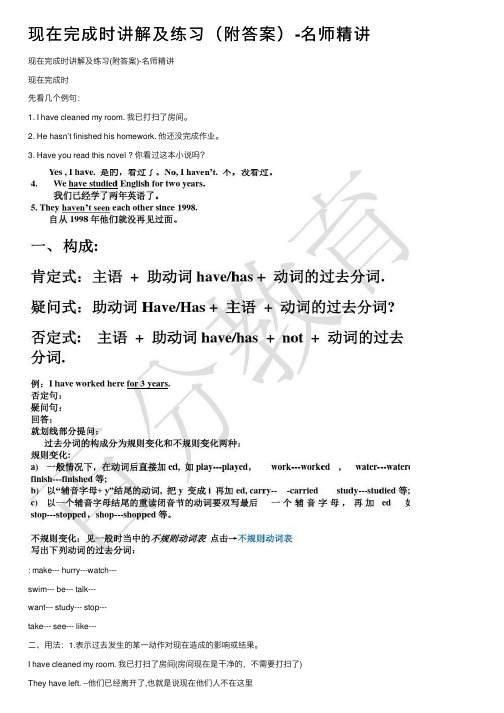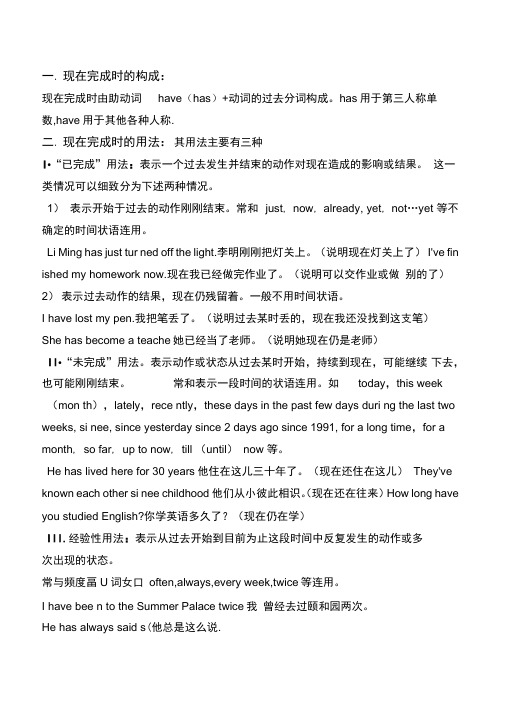现在完成时讲解与练习答案
英语时态之现在完成时(练习题及答案)

英语时态之现在完成时一、什么是时态时态就是表示一个动作发生的时间和所处的状态。
“时”就是这个动作发生的“时间”;“态”就是这个动作在某个时刻的“状态”。
二、时间的定义英语中把时间分为三类,即:过去现在将来三、状态的定义状态指的是在某个时刻这个动作所处于的状态。
动词共有四类状态,分别为:一般式、进行式、完成式和进行完成式。
1.一般式表示经常发生的动作,其动词形式为do例:I often get up at 7.我经常在七点钟起床。
2.进行式表示正在进行的动作,其动词形式为“be动词+ doing”例:She is singing a French song.她正在唱一首法语歌。
3.完成式表示对“之前发生动作”的一个总结,其动词形式为“have + done”例:They have found the missing child.他们找到那个失踪的孩子了。
4.完成进行式表示对“正在进行动作”的一个总结,其动词形式“have + been + doing”例:I have been reading books for two hours.我已经连续读书两个小时了。
四.现在完成时(has\have done)(一)、完成时态的核心含义:完成时态的核心意义就是表示“回顾”即从一个时间点回顾到另外一个时间点,因此完成时态必定涉及前后两个时间。
(二)、现在完成时态表示的是一个横跨前后两个时间点的事件,其结构:have\has + done(三)、现在完成时态的讲解1.现在完成时中延续动作与时间状语的关系:谓语是延续的所以时间状语也必须是延续的。
例:I have learned English for over ten years now ,but I still can not speak it well.I have been married for over a year .I am happily married.注意:在现在完成时态中常用以下两个结构引导时间(1).Since + 时间点或从句Man has lived in fear of fire since time began.(2)For + 时间段Great changes have taken place in Beijing for the past few years.常见的用在现在完成时态当中的时间短语有:in the past fewyears ,over the past few years ,during the last three months, for the last few centuries,through centuries 和throughout history2.现在完成时态中过去发生的动作重复到现在还可能重复下去。
最新英语现在完成时解题技巧讲解及练习题(含答案)

最新英语现在完成时解题技巧讲解及练习题(含答案)一、初中英语现在完成时1.The Greens many places of interest since two years ago.A. has visitedB. have visitedC. visitedD. will visit【答案】 B【解析】【分析】句意:自两年前开始,格林一家参观了许多名胜。
since引出的时间状语从句,强调主句谓语从过去某时一直延续到现在,主句用现在完成时态,the Greens格林一家,表示复数含义,作主语,谓语用复数形式。
故选B。
2.—Do you still play basketball?—Oh, no. I ____ it for the past two years.A. haven't playedB. didn't playC. won't playD. hadn't played【答案】A【解析】【分析】句意:——你还打篮球吗?——哦,不了。
我已经有两年没有打过了。
根据句中的for the last two years可知应与完成时态连用,又有时间是the last two years可知是从现在往前两年,因此应使用现在完成时态,故选A。
【点评】考查动词时态中的for+段时间与完成时态连用,根据时间确定是现在完成还是过去完成。
3.—How do you like Beijing, Miss Read?—I've no idea. I _____ there.A. have goneB. have beenC. haven't beenD. haven't gone【答案】 C【解析】【分析】句意:---你觉得北京怎么样,瑞得小姐?---我不知道,我没有去过那儿。
短语:have been to去过某地(已经返回);have gone to去了某地(尚未返回),根据句意,故答案为C。
(英语)高中英语现在完成时解题技巧讲解及练习题(含答案)

C.went to D.has gone to
【答案】B
【解析】
【详解】
考查时态。句意:Green一家人来中国已经五年了。时间状语for five years表明用现在完成时,The Greens作主语时,谓语动词用复数,而且接一段时间要用have been in,故B项正确。
考点:考查时态
3.With people paying attention to fitness, self-service mini-gyms, each covering about 5 square meters, ________ in China’s major cities these years.
考点:考查非谓语动词
7.Tony is one of the five students in his class who ______ the exam. How lucky he is!
A.is passingB.passes
C.has passedD.have passed
【答案】D
【解析】
考察时态语态。托尼是班上5个通过考试的学生之一,他真幸运。由题意可知,通过考试这件事在人谈论这件事之前发生,所以,采用完成时态。通过考试是主动形式,并且定语从句中的who修饰的是five students,所以是have passed,故选D
A.Having been asked B.To ask
C.Having asked D.To be asked
【答案】A
【解析】
试题分析:“由于那天晚上被要求加班,我错过了一场精彩的电影”,主语“我”和动词ask之间是动宾关系,要用过去分词,“被要求加班”这一动作发生在动作missed之前,要用过去分词的完成式having been asked,A项正确;B项to ask是动词不定式,表示目的或将要发生的动作,不正确;C项having asked是现在分词的完成式,不正确;D项to be asked是动词不定式的被动形式,不符合语境,故选A。
现在完成时讲解及练习(附答案)-名师精讲

现在完成时讲解及练习(附答案)-名师精讲现在完成时讲解及练习(附答案)-名师精讲现在完成时先看⼏个例句:1. I have cleaned my room. 我已打扫了房间。
2. He hasn’t finished his homework. 他还没完成作业。
3. Have you read this novel ? 你看过这本⼩说吗?: make--- hurry---watch---swim--- be--- talk---want--- study--- stop---take--- see--- like---⼆、⽤法:1.表⽰过去发⽣的某⼀动作对现在造成的影响或结果。
I have cleaned my room. 我已打扫了房间(房间现在是⼲净的,不需要打扫了)They have left. --他们已经离开了,也就是说现在他们⼈不在这⾥I have had my lunch.--我已经吃过午饭了,也就是说我现在不饿2.表⽰过去已经开始, 持续到现在的动作或状态,I have learnt English for more than ten years.我已经学了10多年的英语。
She has swum since half an hour ago.我已经游泳了半个⼩时3表⽰⼈曾有过或到⽬前为⽌从未有过的经历.I have never had a car (我从未有过汽车。
)I have been there twice.动词填空:1._____ you ________(clean) the room?Yes, we __________(do) that already.When _______ you ______(do) it?We _______(do) it an hour ago.2.______ he ______(see) this film yet? Yes.When _____ he _____(see) it?He ______ it last week.3. How many times _____you______(be) there?三、标志词◆常与①already, ②never, ③ever,④just,⑤yet, ⑥before, ⑦up to now,⑧so far,⑨for the last few weeks ⑾since ⑿for along time/for标志词的区别1.for +⼀段时间Eg. I have been here for 5 weeks.He’s studied English for 3 years.2. since +(表⽰过去某⼀时间的)时间点/单词/词组/ 从句(⼀般过去时)Eg. I have been here since 2000.I have been here since 5 years ago.I have been here since I graduated in 2000.注2): 对for或since引导的时间状语提问必须⽤how long, 决不能⽤when.How long have you lived here?Eg. I have lived here for 10 years.注3): 短暂性动词不能和for或since引导的时间状语连⽤, 当然也不能⽤于how long引导的问句中Eg.(误)I have left there for 5 years.(正)I have been away there for 5 years.选⽤for和since填空:1.We haven’t seen each other ______ a long time.2.His father has been in the Party ______ 10 years ago.3.The film has been on ______ 20 minutes.4.Mr Green has worked here ______ he came to China.5.His grandparents have been dead ______ several years.6. It’s five years _______ we met last time.a)already 往往⽤于肯定句,⽤在疑问句时表⽰强调或加强语⽓;yet ⽤于否定句和疑问句。
现在完成时及现在完成进行时讲解及练习

一.现在完成时的构成:现在完成时由助动词have(has)+动词的过去分词构成。
has用于第三人称单数,have用于其他各种人称.二.现在完成时的用法:其用法主要有三种I•“已完成”用法:表示一个过去发生并结束的动作对现在造成的影响或结果。
这一类情况可以细致分为下述两种情况。
1)表示开始于过去的动作刚刚结束。
常和just, now, already, yet, not…yet 等不确定的时间状语连用。
Li Ming has just tur ned off the light.李明刚刚把灯关上。
(说明现在灯关上了)I've fin ished my homework now.现在我已经做完作业了。
(说明可以交作业或做别的了)2)表示过去动作的结果,现在仍残留着。
一般不用时间状语。
I have lost my pen.我把笔丢了。
(说明过去某时丢的,现在我还没找到这支笔)She has become a teache她已经当了老师。
(说明她现在仍是老师)II•“未完成”用法。
表示动作或状态从过去某时开始,持续到现在,可能继续下去,也可能刚刚结束。
常和表示一段时间的状语连用。
如today,this week (mon th),lately,rece ntly,these days in the past few days duri ng the last two weeks, si nee, since yesterday since 2 days ago since 1991, for a long time,for a month, so far, up to now, till (until)now 等。
He has lived here for 30 years他住在这儿三十年了。
(现在还住在这儿)They've known each other si nee childhood他们从小彼此相识。
英语现在完成时答题技巧及练习题(含答案)及解析

英语现在完成时答题技巧及练习题(含答案)及解析一、初中英语现在完成时1.—Where's your father?—He _______ to Changsha.A. have beenB. has goneC. has beenD. have gone【答案】B【解析】【分析】句意:——你爸爸在哪?——他去了长沙。
因为父亲不在,证明他去了某个地方没有回来。
之前发生的动作对现在造成的影响用现在完成时,结构为have/has+过去分词,主语he是第三人称单数,助动词用has,go的过去分词是gone,故选B。
【点评】考查现在完成时,注意去过某地用have/has been to,去了某地用have/has gone to。
2.My father ____ in a panda protection center for 10 years, so he knows a lot about panda.A. was workingB. is workingC. has workedD. will work【答案】 C【解析】【分析】句意:我父亲在熊猫保护中心工作了10年,所以他对熊猫很了解。
由句中的语句for 10 years 提示可知,此句要用现在完成时,主语my father,助动词要用has,故选C。
【点评】考查现在完成时的基本结构及用法,注意根据句子的时间状语判断时态。
3.—Your shoes are so old. Why don't you buy a new pair?—Because I all my money on an MP5.A. spendB. have spentC. am spendingD. was spending【答案】 B【解析】【分析】因为把所有的钱都花在MP5上,所以没钱买鞋。
强调过去发生的动作对现在的影响,应用现在完成时,故选B。
【点评】考查现在完成时的用法,强调过去发生的动作对现在造成的影响。
现在完成时练习题及答案(老师专用) (1)
现在完成时讲解一.现在完成时结构:S(主语)+have/has(单三人称用has)+p.p.(过去分词)+时间状语(for+时间段/since+时间点/since+从句---用过去时)1.他已经到达了北京。
2.他还没有到达北京。
3.他到达北京了么?4.是的,他到了。
/不,他还没到。
二.P.P.过去分词1.规则动词的过去式和过去完成时是一致的。
2.不规则动词的过去式和过去分词大部分一致,少数要求一一记忆(在过去式记忆清楚的基础上)。
写出下列单词的过去式和过去分词watch live changestudy carrystaycry prefer dropAAA cut puthit AAB beatABC fly begin write ABB buy lose dream二.现在完成时的标志already(已经),yet(只用于否定句和疑问句句尾,用在否定句中翻译成“还没”,用在疑问句中翻译成“已经”),just(刚刚),ever(曾经),never(绝不,从不),before(之前),so far(到目前为止),since(自...以来),for+时间段1.我已经刷过牙了。
2.我还没吃早饭。
3.我刚刚完成了我的家庭作业。
4.到目前为止我已经学习2000个单词。
5.我之前从没去过北京。
三.for/since①since:(自…以来)1)since+时间点1.自从下午5点以来,他就一直呆在这里。
2)since+时间段+ago2.从五个小时以前他就一直呆在这里。
3)since+从句(从句用过去时)3.她在这教英语自从她来到这里。
②for+时间段1.)他已经学了五年的英语了。
③对for或since引导的时间状语提问必须用how long,决不能用when.1).I have lived here for six years.(划线提问)2).He has been in China since he came.(划线提问)四.瞬间动词和延续性动词的转化瞬间动词,也叫终止性动词、点动词、非延续性动词、短暂性动词。
【英语】高中英语现在完成时解题技巧讲解及练习题(含答案)
【英语】高中英语现在完成时解题技巧讲解及练习题(含答案)一、单项选择现在完成时1.We two thirds of the project so far and we’re sure to complete it on time.A.finish B.will finishC.have finished D.finished【答案】C【解析】【详解】考查时态。
句意:到目前为止,我们已经完成了三分之二的项目,我们一定会按时完成。
根据句中时间状语so far可知用现在完成时。
故选C。
【点睛】本题考查现在完成时,现在完成时是“过去的动作或状态持续到现在并且已经完成”。
判断现在完成时的标志词有already , ever , never , yet , just , before, still , lately ,since , for a long time ,up to now, until, so far, in the last few years/weeks/mouths , till now, recently等,考生在平时学习英语过程中要多注意积累。
本题只要抓住句中时间状语so far(到目前为止)就可以判断出用现在完成时。
2.By now 516 Confucius Institutes ______in 142 countries and regions, according to the Confucius Institute Headquarters.A.founded B.would foundC.have been founded D.had been founded【答案】C【解析】考查时态和语态。
句意:根据孔子学院总部的统计,到现在为止,全世界142个国家和地区已经建立了516个孔子学院。
主语516 Confucius Institutes和found之间是被动关系,该句应用被动语态。
英语现在完成时专题练习(及答案)及解析
5.—What a stupid mistake!
—Yes. I ______ you doing it carefully, but without success.
A.was suggestingB.will suggest
C.have suggestedD.had suggested
【解析】
【详解】
考查时态。句意:在过去的12个月里,该公司取得了10%的进步。表示“过去的动作或状态对现在造成的影响和结果”,用现在完成时,故选D。
2.After he left college, he was employed in an international company andthere ever since .
A.worked B.had worked
C.has worked D.was working
【答案】C
【解析】
【详解】
考查时态。句意:他大学毕业以后,被一家跨国公司雇佣了,从那以后就一直在那里工作。句中时间状语ever since意为“从那以后”,表示从过去时间开始到现在,通常与现在完成时连用,故C项正确。
考点:考查非谓语动词
7.Tony is one of the five students in his class who ______ the exam. How lucky he is!
A.is passingB.passes
C.has passedD.have passed
【答案】D
【解析】
考察时态语态。托尼是班上5个通过考试的学生之一,他真幸运。由题意可知,通过考试这件事在人谈论这件事之前发生,所以,采用完成时态。通过考试是主动形式,并且定语从句中的who修饰的是five students,所以是have passed,故选D
中考英语现在完成时练习题20题(答案解析)
中考英语现在完成时练习题20题(答案解析)1.I have ____ finished my homework.A.alreadyB.yetC.just答案解析:A。
“already”用于肯定句中,表示“已经”。
“yet”常用于否定句和疑问句中。
“just”也表示“刚刚”,但一般放在动词前。
2.She hasn't read the book ____.A.alreadyB.yetC.just答案解析:B。
“yet”用于否定句中,表示“还未”。
“already”不能用于否定句。
“just”也不用于否定句中。
3.Have you cleaned your room ____?A.alreadyB.yetC.just答案解析:B。
“yet”用于疑问句中。
“already”不用于疑问句。
“just”在疑问句中不这么用。
4.They have ____ visited the museum.A.alreadyB.yetC.just答案解析:A。
“already”用于肯定句,表示他们已经参观过博物馆了。
“yet”在肯定句中不这样用。
“just”一般放在动词前。
5.I haven't seen him ____.A.alreadyB.yetC.just答案解析:B。
“yet”用于否定句,表示我还没见到他。
“already”不用于否定句。
“just”不在此语境使用。
6.Has she ____ arrived?A.alreadyB.yetC.just答案解析:C。
“just”表示刚刚,在疑问句中可以用“just”询问是否刚刚到达。
“already”不用于疑问句。
“yet”在这个语境不合适。
7.We have ____ had breakfast.A.alreadyB.yetC.just答案解析:A。
“already”用于肯定句,表示已经吃过早餐了。
“yet”和“just”不用于这种肯定句的语境。
- 1、下载文档前请自行甄别文档内容的完整性,平台不提供额外的编辑、内容补充、找答案等附加服务。
- 2、"仅部分预览"的文档,不可在线预览部分如存在完整性等问题,可反馈申请退款(可完整预览的文档不适用该条件!)。
- 3、如文档侵犯您的权益,请联系客服反馈,我们会尽快为您处理(人工客服工作时间:9:00-18:30)。
一、时态讲解:现在完成时 ( 1 )构成:现在完成时由助动词 have + 过去分词构成,助动词 have 有人称和数的变化。第三人称单数用 has ,其余用 have. 现在完成时的否定式直接在助动词后面加上 not 、疑问式是把助动词提到主语之前。以 study 为例,其否定式、疑问式和简单回答形式如下:
否定式 疑问式 I have not (haven’t) studied…. Have I studied…? You have not (haven’t) studied…. Have you studied… ? He has not (hasn’t) studied…. Has he studied…?
否定疑问式 简单回答(肯定 / 否定Have I not (Haven’t I) studied…? Yes, you have. No, you haveHave you not (Haven’t you) studied…? Yes, I have. No, I haven’Has he not (Hasn’t he) studied…? Yes, he has. No, he hasn’( 2 )用法: 1 ) 现在完成时 通常表示在 说话之前已经完成的动作 或存在的状态。说话人强调的是该动作或状态对现在的 结果或影响 。 My daughter has just gone out. 我女儿刚出去。 I’m sure we’ve met before. 我肯定我们以前见过面。 She has arrived. 她到了。 2 )表示持续到现在的动作或状态,往往和包括现在在内的表示一段时间的状语连用,如 recently, already, just, lately, fo r…, since…, yet 等。如: I haven’t heard from her these days. 这些日子我没有收到她的信。 We haven’t seen you recently. 最近我们没有见到你。 They have been away for two years. 他们离开已经两年了。 She has been with us since Monday. ★ 注意: a) since 和 for 的区别 since 后接时间点,如 1993 , last term, yes terday, the time I got there for 后接一段时间,表示 “ 长达多久 ” ,如 ten years, a while, two days 等。 Ex ercise : 用 since 和 for 填空 1. Jim has been in Ireland ______ Monday. 2. Jill has been in Ireland ______ three days. 3. His aunt has lived in Australia ______15 days. 4. Mary is in her office. She has been there ______ 7 o'clock. 5. India has been an independent country ______1974. 6. The bus is late. They've been waiting ______ 20 minutes. 7. Nobody lives in those houses. They have been empty ______ many years. 8. Mike has been ill ______a long time. He has been in hospital ______ October. 1. since 2. for 3. for 4. since 5. since 6. for 7. for 8. since 2 )表示短暂意义的动词如 arrive, leave, borrow, buy, begin, start, die 等,在完成时当中不能和表示一段时间的状语连用,因为它们表示的动作不可能持续。因此,不能说: He has come here for 2 weeks. × The old man has died for 4 months. × They have left only for 5 minutes. × 以上三句话可以改为: He has been here for 2 weeks. The old man has ______ _______ for 4 months. They have _____ _____ only for 5 minutes 2 ) have (has) been 和 have (has) gone 的区别:表示 “ 曾到过某地 ” 要用 “have (has) been”; 表示 “ 已经去某地 ” 要用 “have (has) gone” 。试比较: Where has he been? 他刚才到哪里去了?(已经回来了) Where has he gone? 他上哪儿去了?(人不在) They have been to Canada . 他们到过加拿大。(现在已经不在加拿大) They have gone to Canada . 他们到加拿大去了。(可能在路上和已经到加拿大) . 3 )现在完成时不能和表示过去的时间状语连用,如 yesterday, last year, in 1976, two days ago, just now, when I came in ,但可以和 already, yet, sometimes, always, often, before, lately, recently, once, twice, ever, never 等连用。例如: She has already come. 她已经来了。 I haven’t read it yet. 我还没读过这个。 I have met him before. 我从前曾见过他。 Ma Hong has always been a good student. 马红一直是个好学生。 I have often seen him in the street. 我经常在街上看见他。 They have never been to Yan’an. 他们从未去过延安。 I haven't seen him lately. 我近来没看到他。
Irregular Verbs Base Form Past Form Past Participle bear bore born beat beat beaten become became become blow blew blown bring brought brought build built built buy bought bought catch caught caught choose chose chosen come came come do did done drink drank drunk drive drove driven eat ate eaten fall fell fallen find found found fly flew flown get got got give gave given go went gone grow grew grown have had had hear heard heard keep kept kept leave left left lose lost lost make made made put put put read read read run ran run say said said see saw seen sell sold sold send sent sent sing sang sung sink s ank/ sunk sunk take took taken teach taught taught write wrote wrote am, is was been are were been
Exercise: I. Fill in the blanks with the proper form. 1. I____ already ____ (see) the film. I ________ (see) it last week. 2. _____ he ____ (finish) his work today? Not yet. 3. My father ____ just ____ (come) back from work. He is tired now. 4. Where’s Li Ming ? He __________ (go) to the teacher’s office. 5. I __________ (work) here since I ______ (move) here in 1999. 6. So far I _______________(make) quite a few friends here. 7. How long ________ the Wangs ______________(stay) here ? For two weeks. 8. I ________ just ___________ (finish) my homework. 9. He ________ (go) to school on foot every day. 10.____ you ______ (find) your science book yet? 11. If it ____ (be) fine tomorrow, I'll go with you. 12. The students ____________ (read) English when the teacher came in. 13. Look! The monkey __________ (climb) the tree. 14. My mother __________ (come) to see me next Sunday. 15. I've lost my pen. _________ you ________ (see) it anywhere? 1. have, seen, saw 2. Has, finished 3. has, come 4. has gone 5. have worked, moved 6. ha ve made 7. ha ve , stayed 8. have, finished 9. goes 10. have, found 11. is 12. were reading 13. is climbing 14. is coming 15. Have, seen
